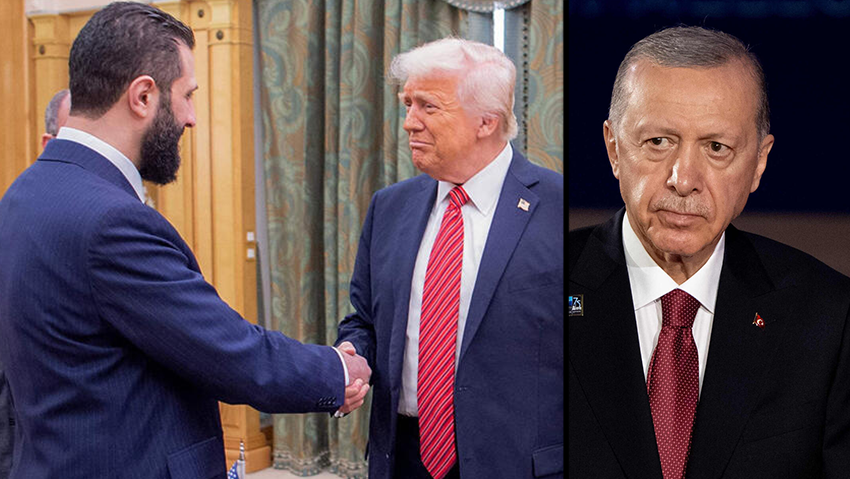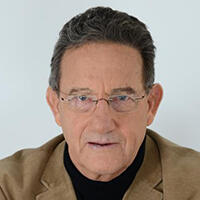The historic meeting on Wednesday between U.S. President Donald Trump and Syrian leader Ahmad al-Sharaa —the first between a U.S. president and Syrian leader in 25 years—is primarily a diplomatic gesture to Turkey, Saudi Arabia and Qatar, in that order. Trump's lifting of sanctions on Syria and his presidential handshake with al-Sharaa—until recently labeled an Islamist terrorist—can be seen as a trade-off for trillion-dollar business ventures the U.S., under Trump’s leadership, is pursuing with the wealthy Sunni Gulf states.
This move is a continuation of a process that began in the early days of Trump’s second term. When Trump was sworn in this January, al-Sharaa, head of the Islamist paramilitary group Hayat Tahrir al-Sham, was already based in Damascus, though he was still more widely known by his war alias: Abu Mohammad al-Julani—even though he had already begun donning Western suits.
2 View gallery


Abu Mohammed al-Golani, Donald Trump, Recep Tayyip Erdogan
(Photos: Andrew Harnik / Getty Images Norht America/AFP/ Saudi Royal Palace / Bandar al-Jaloud )
Israel remained wary, and Washington was in no rush to embrace the new Syrian ruler. U.S. diplomats, along with congressional and senatorial delegations, traveled to Damascus and presented al-Sharaa with five conditions for lifting the biting sanctions the U.S. had previously imposed on Bashar Assad’s regime for its mass slaughter of civilians.
The American demands were explicit: al-Sharaa had to commit to destroying all remaining chemical weapons stockpiles in Syria; cooperate with the U.S. in counterterrorism efforts; revoke the appointments of non-Syrian Islamists from his organization to senior government positions; help locate missing American journalist Austin Tice, who disappeared in Syria in 2012; and designate Iran’s Islamic Revolutionary Guard Corps as a terrorist organization.
Donald Trump meets Abu Mohammed al-Julani
Jerusalem's cautious influence was evident in the list of conditions targeting a man who once led al-Qaida’s branch in Syria. Al-Sharaa announced he would accept all these demands—provided the U.S. lifted its sanctions, particularly the Caesar Act. This act, passed by Congress, effectively bars any entity from engaging in economic, financial or commercial activity with Syria. Without the removal of U.S. sanctions, Turkey, Saudi Arabia, Qatar and the UAE would be unable to finance Syria’s reconstruction or deploy construction and energy companies to the country.
'Al-Sharaa? Pretty amazing'
At the request of Saudi Crown Prince Mohammed bin Salman, President Trump met al-Sharaa in Riyadh. Turkish President Recep Tayyip Erdoğan—arguably the biggest beneficiary of this diplomatic thaw—joined remotely. After the meeting, White House Press Secretary Karoline Leavitt said: “President Erdoğan praised President Trump for lifting the sanctions on Syria and pledged to work alongside Saudi Arabia to advance peace and prosperity in Syria.”
She added that “the Crown Prince also praised the move, calling it courageous. President Trump thanked Erdoğan and the Crown Prince for their friendship and told President al-Sharaa he now has a tremendous opportunity to do something historic for his country.”
2 View gallery


Syrian leader Ahmad al-Sharaa and Turkey's President Recep Tayyip Erdogan
(Photos: Al Arabiya TV/Handout via Reuters, Andrew Harnik / Getty Images North America / AFP)
Following the meeting, the demands on Syria’s new regime shifted. “President Trump encouraged President al-Sharaa to do great work for the Syrian people,” Leavitt said, outlining the new set of expectations: sign the Abraham Accords with Israel; demand that all foreign jihadists leave Syria; expel Palestinian terrorists; assist the U.S. in preventing an ISIS resurgence; and assume responsibility for ISIS detention facilities in northeastern Syria.
According to Leavitt, al-Sharaa expressed his gratitude to Trump, the Crown Prince and Erdoğan for facilitating the meeting. He acknowledged the significant opportunity created by Iran’s departure from Syria and stressed the shared interests of the U.S. and Syria in fighting terrorism and eliminating chemical weapons. Al-Sharaa reaffirmed his commitment to the 1974 disengagement agreement with Israel and voiced hope that Syria would serve as a crucial trade corridor between East and West. He also invited American companies to invest in Syria’s oil and gas industries.
After the meeting, Trump flew to Qatar. Upon landing in Doha, he declared: “Syria’s president will recognize Israel once stability is restored to his country.” Syrian officials have yet to confirm the statement. Trump said the meeting with al-Sharaa had been “great,” and when asked for his impression of the Syrian leader, he responded, “a young, attractive guy. Tough guy. Strong past. Very strong past. Fighter. I think he has the potential—he’s a real leader. He pulled something off, and it’s pretty amazing.”
Billions in profits and the return of refugees: Turkey’s interest
The lifting of sanctions and normalization of ties benefits not only Syria’s new leader but also regional powers—especially Turkey, which stands to earn billions from the reconstruction of Syria. Under the agreed framework, Ankara will rebuild Syria’s economy and military while facilitating the return of around a million Syrian refugees currently in Turkey. Gulf states financing the reconstruction will reap substantial economic rewards and gain political influence.
Seen from this perspective, the lifting of sanctions appears less like a diplomatic gesture and more like a strategic business move by the U.S. to reward Turkey, Saudi Arabia, Qatar and even Lebanon. Until now, Lebanese banks were unable to conduct transactions with or on behalf of Syria. The sanctions’ removal is expected to provide a much-needed boost to Lebanon’s economy, potentially matching Syria’s own recovery prospects. Much of the Gulf funding for reconstruction is likely to be funneled through Lebanese banks into Turkish contractors’ hands.
As for the previous demands on al-Sharaa, some have already been met. He had no problem labeling the IRGC a terrorist organization, pledging cooperation in counterterrorism, or refusing to appoint Chechens to senior posts. But Syria’s chemical weapons stockpiles have not been fully destroyed, and the body of the American journalist murdered by ISIS remains missing.
Crucially, Israel’s concerns about al-Sharaa remain unresolved. Jerusalem fears that the jihadist known as al-Julani may reemerge once the new suit-clad regime gains international legitimacy, especially from the U.S. As a precaution, the IDF remains deployed at nine posts in the buffer zone on the Golan Heights. Despite the friendly optics in Saudi Arabia, the U.S. still does not fully trust the new Syrian leader or his former jihadist associates, who are currently projecting a veneer of moderation.
Get the Ynetnews app on your smartphone: Google Play: https://bit.ly/4eJ37pE | Apple App Store: https://bit.ly/3ZL7iNv
Proof of this mistrust lies in the Pentagon’s decision—under Trump’s directive—to vacate only three of its eight military outposts in Syria. All three are in the northeast, an area Turkey wants as a buffer zone separating its southeast from U.S.-backed Syrian Kurdish fighters allied with the PKK. The U.S. has also reduced its troop presence in Syria from 2,000 to 900, though most remain stationed in areas once held by ISIS. There, they continue to engage in counterinsurgency operations alongside Kurdish-led Syrian Democratic Forces and Arab tribes along the Jordanian border.
The U.S. also retains control of the al-Tanf base on the Syria-Jordan border to prevent ISIS from regaining ground and to counter threats to Jordan’s Hashemite regime. The area is also a conduit for Iranian weapons smuggling into Jordan and the West Bank, as well as Hezbollah.
For these reasons—regional stability, the fight against ISIS, and halting Iranian arms smuggling—the U.S. continues to maintain forces in Syria. Trump, however, diplomatically sidestepped this issue during his conversation with al-Sharaa. The new Syrian leader is reportedly frustrated with the U.S. presence in northeastern Syria, where the Kurds have established de facto autonomy, limiting control by both Damascus and Ankara. This region, rich in oil and bisected by the Euphrates River, is vital to the economies of both Syria and Iraq.
It’s unclear what, if anything, Trump and al-Sharaa agreed upon regarding U.S. military presence, but it appears the Syrian leader is content with American recognition and the lifting of sanctions for now, leaving the military issue for another time. Ankara, for its part, seems less concerned about the U.S. presence than before, especially after the PKK announced it was disbanding and ending its armed struggle within Turkey, easing fears of coordination between Syrian Kurds and the PKK.
Once again, Trump doesn’t consult Israel — the only loser
The bottom line: everyone stands to gain from the Trump administration’s rapprochement with Syria’s new regime—especially Turkey, followed by Syria, Qatar, Saudi Arabia, and Lebanon, in that order. But Israel remains deeply concerned, not only about the potential jihadist threat posed by al-Sharaa’s regime, but also about Trump’s failure to coordinate his intentions with Jerusalem.
While Trump expressed hope that Syria would join the Abraham Accords and al-Sharaa reportedly told visiting members of Congress he was seriously considering the idea, his men remain active on the ground. Periodic violent clashes—often along sectarian lines—still erupt between his forces and the Druze community under Israeli protection.
The sanctions' removal also clears the way for Turkish companies to operate freely throughout Syria as part of reconstruction efforts. There is growing speculation that Erdoğan may also help rebuild the Syrian military—which, all signs suggest, will be a hardline Islamic force positioned directly along Israel’s border.
Still, there’s a chance that these fears may not materialize and that the long-awaited miracle will occur: that al-Julani will indeed transform into a benevolent ruler focused on rebuilding his nation. If that happens, even Israel may benefit in the end.
No one can predict the future, but all signs suggest Syria’s reconstruction—including the rebuilding of its military—will begin soon. The irony is that Russia and Iran once competed for a share of the postwar economic spoils. Now it seems the real winner is Erdoğan, thanks to a generous President Trump, who sees the Turkish leader as a vital strategic partner—one to whom he readily offers gifts and benefits, even at the expense of Israel’s concerns.




